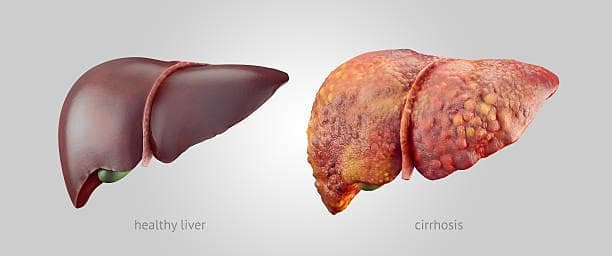Early Signs Of Liver Disease: Warning Symptoms To Watch Out For
We might think that health is wealth is a cliché, but it’s not.
On most days, we do not give second thoughts to the glasses of wine we consume, nor do we consider the amount of fat present in the meals we eat.
Sometimes, exercise is a no-go area, and we are oblivious to our unhealthy lifestyle, which could damage our liver.
The liver carries out several functions in the human body, but these functions are classified into four groups; supporting the immune system, regulating blood clotting, cleaning out the bloodstream, and aiding digestion.
From these functions, it is evident that almost everything we do directly impacts the liver.
When the liver is experiencing damage, it often sends out warning signs to alert the individual.
Although the liver disease does not usually show symptoms at the onset, this article highlights some early signs and other warning signs of liver disease you should watch out for.
What Will We Learn?
Early Signs of Liver Damage

There are two categories of liver disease:
- Acute liver damage: which happens suddenly without prior warnings. Causative factors could be toxins, infections, wrong medications, or autoimmune malfunction.
- Chronic liver damage, on the other hand, happens progressively and can be caused by different factors.
The doctors at Fibronostics say that early signs of liver damage often start as soon as the liver cannot complete one of its functions.
With that being the case, you should pay attention to your body for any of the following symptoms.
However, it’s important to note that these symptoms will vary per individual.
- Pain in the upper right corner of the abdomen resulting from an inflamed liver
- Exhaustion
- Diarrhea, which could lead to weight loss
- Reduced appetite
- Nausea
- Increased bleeding
- Jaundice
Other Warning Signs of Liver Damage
Apart from the early signs mentioned above, the following are other warning signs of liver damage.
Loss of Appetite
Leptin makes you feel less hungry, while ghrelin increases your hunger level, and these are two hormones that control hunger in the human body.
When the liver fails, leptin, which does not make one hungry, is produced in a larger quantity than ghrelin.
Appetite loss is a primary symptom of liver damage because one of the functions of the liver is to aid digestion.
When the liver loses its functions, patients experience poor digestion and nausea, leading to appetite loss.
Poor Sleep
In the case of liver failure, four factors work hand in hand to give a patient a poor sleep pattern.
There will be changes in the body temperature, the processing of glucose and melatonin, and the production of ghrelin.
Medication is often thought of as the best way out in this situation, but it isn’t because people with failing livers do not effectively digest medications.
Memory Skips
The liver is vital to human existence, and one of its features is how it transports toxins out of the blood.
When these toxins remain in the blood for too long because of liver failure, it affects the nervous system, which controls brain functions and memory.
Memory skips can happen slowly or acutely and without any forewarning.
Irritability
Not everyone will experience this symptom, and the extent of the irritability might be mild or severe.
The irritation can be in a single body part or all over.
You’re advised not to take anything for the itch unless you have confirmation from your medical practitioner.
Jaundice
A healthy liver separates bilirubin from the blood, but when the liver fails, bilirubin builds up in the blood, causing yellowish eyes and skin.
Two factors that cause jaundice are an inflamed liver or blocked bile ducts.
Sometimes, jaundice could be the first and only symptom that will surface if the liver is damaged.
Inconsistent Body Weight
This symptom is twofold; weight loss, which happens because of a lack of appetite, and weight gain, which occurs due to fluid retention.

Fluid Retention
Ascites or fluid retention is often caused by cirrhosis, which allows the liver to scar.
Fluid retention makes it difficult for a patient to move around and is caused by hepatitis, alcohol abuse, or nonalcoholic fatty liver disease.
Enlarged Breasts
Breast enlargement, as a symptom of liver failure, often happens in men.
One cause of enlarged breasts is the body’s inability to break down certain hormones, which can lead to increased production of gynecomastia.
Alcohol abuse also causes enlarged breasts because alcohol contains an ingredient that poses as the estrogen hormone, which makes it produce more estrogen than testosterone.
Increased Bleeding
One of the downsides of liver damage is increased bleeding.
Because the liver produces all the products the body needs for blood clotting, the blood fails to clot when the liver fails.
Have you noticed any of these symptoms?
If you have, we advise that you see your doctor immediately.
The longer you let it be, the more dangers it poses to your health.
Our article on urinary incontinence may also attract your attention.
